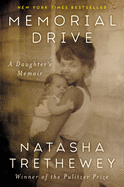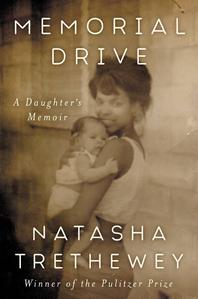
 Natasha Trethewey, two-term United States Poet Laureate, forges a serious, poignant work of remembrance with Memorial Drive: A Daughter's Memoir. Trethewey's mother, Gwen, is the focus of this book: the daughter's memories and what she's forgotten, and, pointedly, the mother's murder at the hands of her second ex-husband. The murder took place just off Memorial Drive in Atlanta, Ga.; the aptly named thoroughfare runs from downtown to Stone Mountain, monument to the Confederacy, "a lasting metaphor for the white mind of the South."
Natasha Trethewey, two-term United States Poet Laureate, forges a serious, poignant work of remembrance with Memorial Drive: A Daughter's Memoir. Trethewey's mother, Gwen, is the focus of this book: the daughter's memories and what she's forgotten, and, pointedly, the mother's murder at the hands of her second ex-husband. The murder took place just off Memorial Drive in Atlanta, Ga.; the aptly named thoroughfare runs from downtown to Stone Mountain, monument to the Confederacy, "a lasting metaphor for the white mind of the South."
Trethewey is the daughter of an African American mother and a white Canadian father. Their marriage was illegal; she was born just before the Loving v. Virginia Supreme Court case that struck down laws banning interracial marriage. Memorial Drive begins with her upbringing in Mississippi with her doting extended maternal family, necessarily recounting her early understanding of race and racism. This happy period ends abruptly with mother and daughter's move to Atlanta, when Trethewey's parents divorce. Atlanta has its strengths, such as a vibrant African American community, but very quickly, Gwen meets the man who will become her second husband. From the beginning, Joel is a sinister figure. Twelve years later, 19-year-old Trethewey returns to Atlanta from college to clean out her mother's apartment after Joel brutally murders Gwen.
While this central event is harrowing, Memorial Drive does not focus only there. Trethewey ruminates on memory and forgetfulness, and recalls her developing love for and skill with metaphor, language, writing. Back home in Mississippi, her great-aunt "would appear each day at the back door, singing my name through the screen, her upturned palm holding out toward me three underripe figs... she was teaching me the figurative power of objects, their meaningful juxtapositions." During the painful retelling of her stepfather's physical abuse of her mother, Trethewey resorts to the second person, a whole chapter delivered to her younger herself. Concluding: "Look at you. Even now you think you can write yourself away from that girl you were, distance yourself in the second person, as if you weren't the one to whom any of this happened." Memories of her mother often appear as images, offering symbolic interpretations of the 12-year gap left by trauma. While Trethewey does pursue forensic exploration (transcripts of recorded phone calls between Gwen and Joel, as well as a visit to a psychic), this memoir is more introspection than true-crime investigation. And it is gracefully and gorgeously rendered, as befits a poet of Trethewey's stature.
Trethewey declines to offer a neat conclusion, but she succeeds in making meaning from pain. Memorial Drive is loving and elegiac, disturbing and incisive. --Julia Kastner, librarian and blogger at pagesofjulia
Shelf Talker: A former U.S. Poet Laureate remembers her mother, and wrestles with her brutal murder, in compelling and feeling style.

